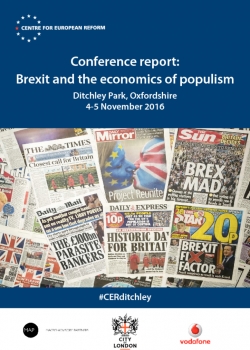
Brexit and the economics of populism
November's conference brought together 50 leading economists and commentators to consider Brexit and the economics of populism. Was Britain’s vote to leave the EU the first rebellion in a developed country against globalisation? Was further globalisation of trade and finance compatible with political stability? To what extent should we blame the macroeconomic policy response to the financial and euro crises for rising populism? Did we need stronger institutions to regulate, stabilise and legitimise markets? Did we need more income redistribution to counter inequality, more investment, and stronger action against rent-seeking? Could governments counter anti-immigrant feeling by employing the right mix of economic and social policies? Or could immigration be limited without damaging side-effects?
The participants largely agreed that globalisation had not been the driving force behind the Brexit vote. Rising inequality and economic insecurity had been factors, but reflected the deregulation of labour and financial markets, technological change and tax and housing policies, more than globalisation itself. Social and cultural factors had also played a major role in the vote. The relationship between economic wellbeing and backing for populists was loose. Brexit supporters were much older than average, had not been affected economically by immigration or suffered disproportionately from the financial crisis.
The participants largely agreed that globalisation had not been the driving force behind #Brexit
Tweet thisBluesky thisSupport for central bank independence was fraying, there was now broad-based support among economists for government intervention to bolster demand, and an acceptance that financial stability required the authorities to actively regulate markets. There was a case for fiscal expansions and for ending the prohibition on monetary financing, but this would be no silver bullet: the productivity slowdown had started before the financial crisis, and the savings glut pre-dated it. A shock and awe strategy could also backfire by feeding populist resentment against central banks in Germany, the US and elsewhere.
For some, defending free trade and macroeconomic stability required controls on capital flows between countries. Others disagreed: financial globalisation helped individuals and states to diversify their risks and to insure against shocks. The problem was the composition of capital flows and the lack of burden-sharing between creditors and debtors. Several participants argued that there were losers from trade and they had to be compensated. Others agreed governments needed to help them, but argued that there was no more reason to worry about people who lost jobs from trade than from technological change.
For many, inequality had little to do with populism. Populist movements did not draw much support from the poor and the dispossessed, but from among older voters, who had been less affected by rising inequality, both of income or wealth, but felt alienated from cosmopolitanism. But others stressed that technology and globalisation had increased the bargaining power of the high-skilled who lived in large, rich cities relative to the lower-skilled who lived in more isolated and struggling areas. And it was in these places that populism was flourishing.
The participants agreed that hostility to migrants was rooted in nativism, not economics
Tweet thisBluesky thisThe participants agreed that hostility to migrants was rooted in nativism, not economics. Governments should stress immigration’s benefits; devote more resources to areas where immigration was high; and ensure housing was affordable. A minority thought that the link between migration fears and political extremism justified tighter curbs on immigration. They were divided over whether the EU’s single market required free movement of labour to work, but agreed that it was essential within the eurozone. However, it would cause serious tensions if it was the only mechanism for adjustment between members of the currency union.

